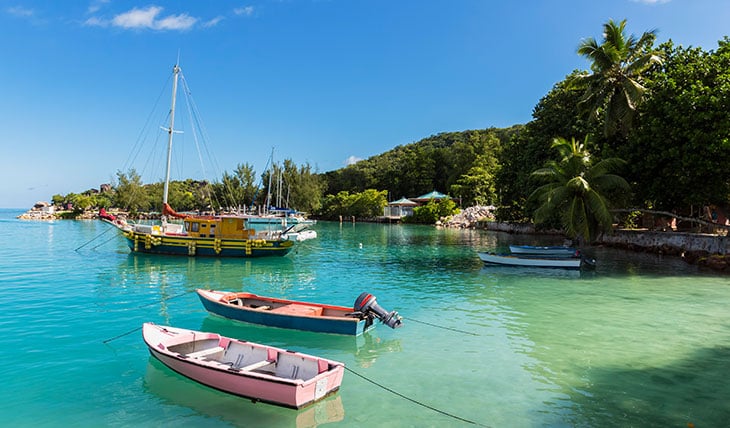In Euromonitor's Voice of the Consumer: Travel Survey, the future traveler of 2023 is represented by eight distinct segments in terms of travel preferences, behaviors and values. The list also includes a luxury seeker, defined as a frequent traveler who takes at least two leisure trips abroad per year. People who want high-quality products and services think it's important for others to see them do well and it's important to spend money on experiences.
When it comes to consumers seeking luxury goods, the highest penetration of these consumers is first in the Middle East and Africa, followed by Asia Pacific, and third in Western Europe.
The Middle East is particularly high on the list of top countries for luxury-minded people, including Saudi Arabia (27% of respondents) and the UAE (25% share).
Source: Euromonitor International Consumer Voice: Travel Survey 2023
Euromonitor Consumer Voice: According to travel research, India is the country with the highest number of luxury seekers, with 31% penetration of respondents in this segment.
Beyond stereotypes: new dimensions of luxury travel require faster digital adoption
Contrary to stereotypes, luxury seekers are highly digitally savvy, with 74% booking their travel online, but luxury travel is more expensive and offers higher levels of customer service and personalization. Given the expectations, we highly value expert advice in-store.
It's important not to underestimate the power of loyalty. Luxury seekers are the largest segment who enjoy using loyalty schemes and membership cards to receive special deals and perks, and get rewarded according to their habits. It has been revealed that he has 34% of respondents compared to the global average of 24%. According to Euromonitor Consumer Voice: Travel Survey 2023.
Interestingly, the highest penetration of luxury seekers is among Millennials aged 30 to 44, followed by Gen Z aged 15 to 29, as wealth shifts to younger generations. This is consistent with the overall trend. 20 years until 2040. By 2040, Millennials are expected to make up 36% of the population with annual incomes of $250,000 or more (26.1 million people), while Baby Boomers will make up 24% of the population.
Luxury seekers are looking for exclusive airport lounges, priority security, priority boarding, and even private jets to make their travel experience more efficient and enjoyable. This is rapidly becoming a reality, as biometric authentication helps enable end-to-end paperlessness.
Mexican luxury hotel group Ahau Collection and Backstage Solutions have teamed up to create a new loyalty program that includes NFTs to offer perks and experiences to visitors and members. By embracing digital assets, the company is rethinking how its loyalty program operates to appeal to digitally savvy travelers.
Shared family time requires exclusivity and privacy
What Euromonitor Consumers Say: Travel research shows that when luxury seekers compare their typical travel companion to the global average, family is their top priority.
The multigenerational trend is alive and well, as 72% of luxury seekers will travel with a partner or spouse and 56% will travel with their children in 2023.
Source: Euromonitor International Consumer Voice: Travel Survey 2023
Enjoying time together as a family reflects the importance of shared moments when families come together and celebrate, taking a break from everyday life.
Clearly, building new experiences that create lasting memories is a key driver of why luxury seekers primarily travel with their families, while only 4% of people travel alone. is. Travel companies and destinations would be wise to ensure that their services cater to the diverse needs of multi-generational family groups, ensuring quality time and privacy.
Redefining luxury travel to suit the lifestyle, purpose and health needs of luxury seekers
Luxury brands are undergoing a redefinition, aligning themselves with the lifestyle category. These lifestyle enhancements serve as additional streams of untapped revenue while helping luxury fashion and beauty brands respond to evolving consumer priorities and identify new ways to engage with customers. Given its ability to be integrated into customers' daily lives, it's a way to invest in long-term brand equity and strengthen both tangible and intangible assets.
This gives luxury fashion brands further opportunities to sidestep into this sector by venturing into luxury hospitality with branded cafes, restaurants, food and wine pop-ups, and of course luxury hotels, spas, wellness and residences. is given.
Some large luxury and fashion brands, such as Porsche, Bugatti, and LVMH, traditionally associated with the fashion and automotive sectors, have entered the real estate market by embracing lifestyle trends, creating customized brands for the ultra-wealthy. Provides housing.
Thirty-eight percent of luxury seekers say they will pay 30% to 50% more for sustainable travel features such as energy-efficient services in 2023, and 26% will pay more for sustainable travel features such as energy-efficient services. say they would pay more than 50% to avoid using it and find a mode of transportation with a lower carbon footprint. However, the challenge is that consumers are overwhelmed by the climate emergency and feeling fatigued about how to do the right thing to make a positive impact.
Luxury brands can combine purpose, passion and positive impact to deliver the unique, authentic and exclusive experiences that luxury travelers are looking for. But at the same time, ensuring decarbonization is achieved by adopting a variety of pathways, from waste and water management to energy, transport, materials and supply chain sourcing, and ensuring the social inclusion of communities and cultures. can.
Iberostar operates luxury hotels and is a global leader in sustainable travel and hospitality. Iberostar's Wave of Change Strategy outlines 11 different pathways to decarbonize across Scope 1, 2 and 3 emissions across the supply chain, reducing carbon emissions by 58% by 2030. Masu. The plan is to reach zero through the use of nature-based solutions, including electrification and renewable energy, as well as mangrove restoration. The luxury goods sector has a responsibility to lead the way, as it is inherently carbon-intensive.
To understand how the luxury travel industry is responding to the latest luxury traveler trends, read more about luxury travel in our report Elevating the New Luxury Travel Experience.


